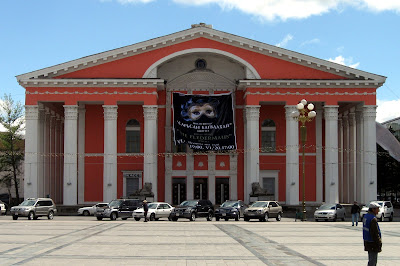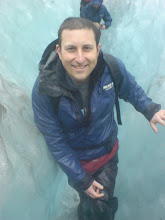After having some real fun times in Chengdu and Xian I got to Hong Kong feeling totally drained and lacking any enthusiasm to do anything other than meet up with the people I'd met on my trip. The weather didn't help, and I kept thinking about all the things (usually people) that I missed. And I was actually thinking that it was time to go home.
But then Antonia e-mailed me about the Tibet trip, and I was thinking: I'll go to Tibet – and then I'll go home.
And while I had some of the best times so far in Tibet – it would be fair to say that there were also some frustrations which made me think: it's time to go home.
I did have a few days of feeling totally fed up in Beijing, and ended up calling a few people just to hear some friendly voices – which really helped – and it was totally what I needed.
And having chatted with Brittny about the whole China experience – I realized that I was suffering from China Fatigue.
Mina – who I'd met in Xian had sent me a list titled: You know you've been in China too long when...with a list of humorous items – there were too many on the list that I recognized.
And so I decided the best thing to do was to try somewhere new, and as I had to leave China anyway because my visa was going to run out, booked the train to Mongolia on a bit of a whim.
In hindsight – I guess it's natural to hit something like this – particularly having been on the road so long (I actually met someone today who was going through the same thing after six months on the road). The constant changes, new beds most nights, lack of continuity – it was bound to have an affect at some point. And I guess it's what people who emigrate to a new country must feel like after six months has gone by and the excitement has worn off.
But I never saw it coming – it just hit. And China (while it's a great place to visit) can be intensely frustrating at times. And so I got on the train to Mongolia feeling really deflated - and trying to work out whether it was time to call it a day.
But then Mongolia happened, and everything changed.
The train takes almost two days to make it's way from Beijing to Ulaan Baatar (which seems to have a number of spellings, although I'll be spelling it UB from now on).
Part of the trip includes having to have the wheels of the train changed, as the track in China is a different space apart from the track in Mongolia. The whole process takes about two hours, and requires the train to be driven into a huge warehouse, where each carriage is lifted up on hydraulic jacks, after which the old wheels are replaced by new wheels.
I'm wondering why they don't just ask you to get on another train (which would take all of ten minutes – but one thing I've learned in China: don't ask why – it's much easier that way :-)
I managed to stay on the train, so was able to watch the whole process, and here are some pics:
Inside the wheel changing warehouse:

Going up:


I was really lucky on the way here, as I had a whole cabin to myself – which was a real luxury (and gave me some much needed thinking time), although I did get chatting to some guy's from Melbourne in the dining car – which was fun.
Here's a few pics of the scenery:
Hot water being heated up using coal:

The train:

Traditional Yurts:

And then, in the afternoon the following day, we arrived in UB...
...and it's amazing how different it is from China. It actually feels different. There's no heavy police presence or people ordering you around, searching your bags, pushing you about, or shouting all the time. It's not excitement capital of the world – but it's got a really great laid back feel about it.
And there's two things I really noticed: It was once under Soviet control, and it reminded me so much of Eastern Europe (just how Slovakia looked back in 1991). And the second thing is how people actually seem to take care about how they look. People make an effort to look good – most people wouldn't look out of place walking through Manchester.
At the hostel I got chatting to a couple from Winchester who were doing the Trans Siberian Train route. They'd both left the army and had decided to try and drive to Mongolia, but their vehicle had broken down in Spain and they'd had to switch to the trains. We got chatting about the tour they were doing, which was three weeks seeing the key stuff in Mongolia.
I'd only planned to be here for a week or so, but it looks like such an amazing place that I was really tempted to do a similar tour. So I started thinking about my trip, and where I wanted to go, and why I was travelling – and I really started getting excited about where I was going and the whole travelling thing.
In the end – I (reluctantly) decided against spending three weeks in Mongolia for a number of reasons: It was really cold (like bitterly cold, and I spent the next day freezing my nuts off while I looked around), and I don't have the right clothes for this type of weather. The tours are also quite expensive (out of my budget), and while you can cut the cost by camping, it would mean buying another tent (to add to the four I already own :-)
So feeling way better than I have for a few weeks, I set off to look around UB. There's not that much to see, and I'd seen everything I wanted to see in a morning.
Amazing modern building in the centre of UB:

The main square:

The opera house;

The main square with the hills and a light dusting of snow in the background:

Random Street:

So I headed back to the train station to buy a ticket to Beijing. There aren't many trains that run direct, so had to buy a ticket for the next day. Which was fine – because there's a few places I can't wait to get to...
That night I went to a popular hang out for the Mongolians, and as it was fully booked out (one of the top bands in Mongolia was playing that night - and they were really amazing - the bass player and drummer were particularly good) I was asked to sit at a table with some other people, and got chatting with a British guy (Jim) and some Mongolians.
It turns out that Jim works for a development agency and was meeting his team in Mongolia on a project they are working on. They very kindly adopted me for the evening – and hanging out with some Mongolians and watching them have fun made a huge impression on me, and I got a real incite into Mongolian life.
In the 90's they broke free of Communist rule, and have switched to a democratic system coupled with a free market – which they are all really proud of. There's no fear of speaking your mind here, and it was refreshing to hear people talking about how things had been, and how they are now. And while it might be the one of the poorest countries in the world – they have a real sense of pride and optimism in the future. 75% of all university students are women and education is seen here as a key to the future – and from my brief time here – I could see that Mongolia has a strong future ahead of it.
It's a really amazing place – and a place I'd love to (is that plan to :-) return to.
When I tell everyone here that I'm in Mongolia for one full day they all say I'm crazy – and maybe I am – but it was exactly what I needed...
Train on the way back to Beijing:








































